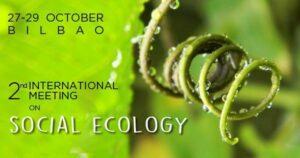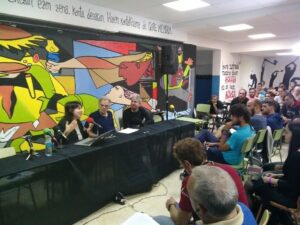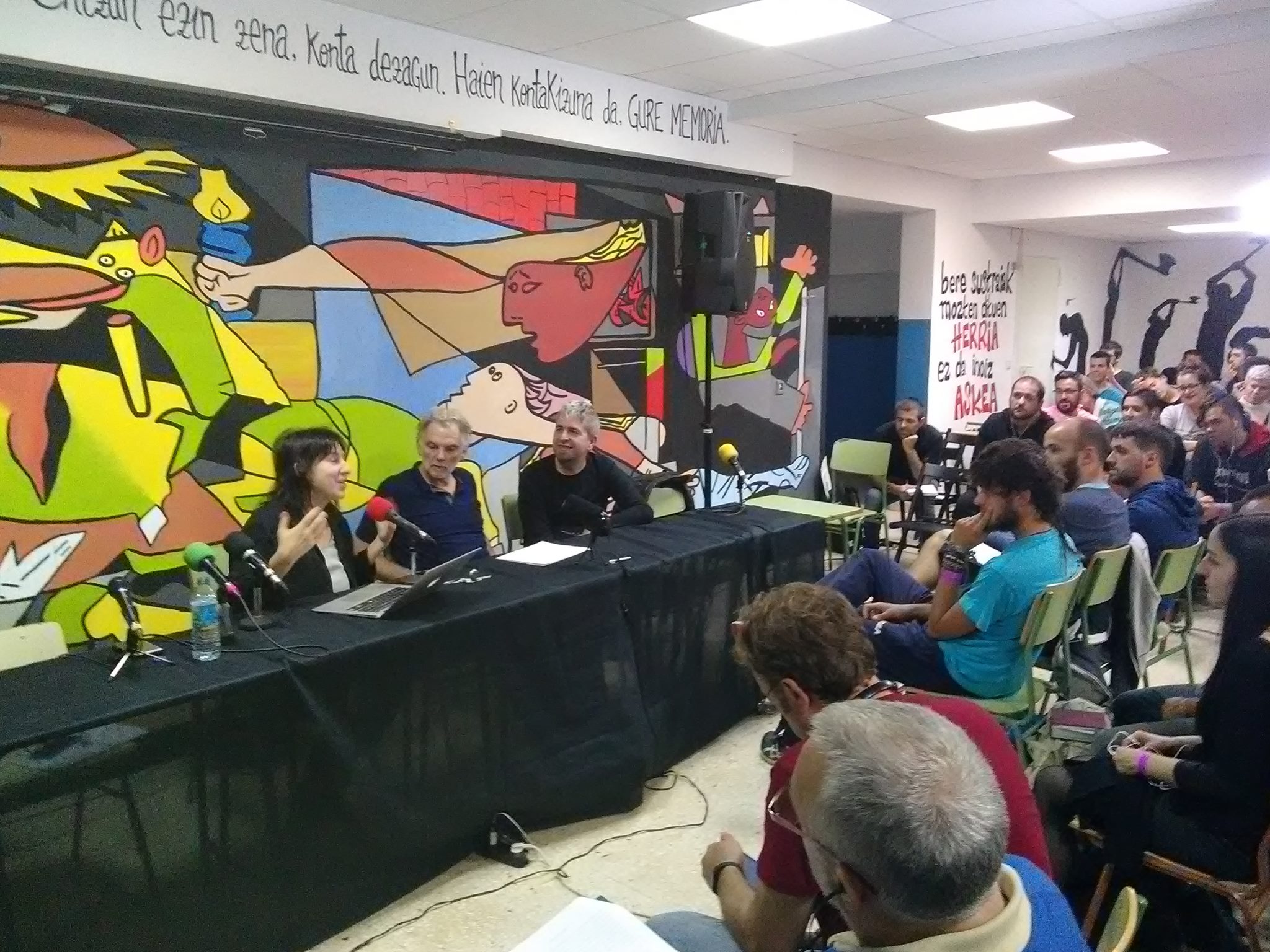This report was just posted by the organizers of the 2nd International Meeting on Social Ecology, held in Bilbao on October 27-29th of this year:
 On the weekend of the 28th of October 2017, the 2nd International Meeting on Social Ecology was held in the occupied school of La Karmela, Bilbao, Euskal Herria (Basque Country). They were an opportunity to pay tribute to the struggles of Euskal Herria, and above all to their self-managing forms of autonomy, stemming from a rich popular and peasant tradition.
On the weekend of the 28th of October 2017, the 2nd International Meeting on Social Ecology was held in the occupied school of La Karmela, Bilbao, Euskal Herria (Basque Country). They were an opportunity to pay tribute to the struggles of Euskal Herria, and above all to their self-managing forms of autonomy, stemming from a rich popular and peasant tradition.
The meetings opened with a presentation of the program by Floréal Romero, a farmer, author and social ecology activist in Spain. The guidelines given at the meeting were to open up a space for debate for different political and social critics, to give visibility to local struggles and alternative forms of political organization, and to make links between all these currents via the theoretical framework of social ecology and the proposal of libertarian municipalism. How to fight against capitalism? How to organize or reorganize ourselves? What lessons can we learn from the initiatives in Chiapas and Rojava, among others? Can we give a satisfactory definition of human and living beings, other than that of “resource”, according to capitalist modernity?
 This was followed by a presentation on Social Ecology by Debbie Bookchin, a North American writer and journalist, daughter of libertarian philosopher Murray Bookchin, who developed the concept of Social Ecology and its political proposition:”communalism”. Briefly, Social Ecology is a philosophical and political movement that synthesizes communist and anarchist thinking, it takes the critique of capital from one side and critique of power hierarchies from the other. From this analysis, we draw a concrete alternative to the trio capital-state-patriarchy, in the form of a society organized in community of communes, functioning by assemblies, a local participative and direct democracy, going from the bottom up.
This was followed by a presentation on Social Ecology by Debbie Bookchin, a North American writer and journalist, daughter of libertarian philosopher Murray Bookchin, who developed the concept of Social Ecology and its political proposition:”communalism”. Briefly, Social Ecology is a philosophical and political movement that synthesizes communist and anarchist thinking, it takes the critique of capital from one side and critique of power hierarchies from the other. From this analysis, we draw a concrete alternative to the trio capital-state-patriarchy, in the form of a society organized in community of communes, functioning by assemblies, a local participative and direct democracy, going from the bottom up.
According to Debbie Bookchin, a different relationship with nature must be considered: it is necessary to break down the misconceptions that nature absolutely determines everything in a living being, and also that nature is hostile and presents a universe of competitiveness. On the contrary, we must see the potential that the creation of democratic and ecological “institutions” gives to human beings to become positively embedded in nature, and the fact that the natural societies most likely to endure are those that practise symbiosis and self-regulation. This relationship with nature, exported into a social organization, gives rise to a multitude of small, self- organizing human groups.
We can distinguish the interventions of the following days into two categories: the practical applications and the theoretical proposals.
In terms of concrete actions, we had the pleasure of welcoming activists from the Hambach forest in Germany. They occupy a piece of land near a railway line serving a coal mine the size of the city of Cologne, which has been open for 30 years. The activists regularly sabotage the railway tracks by padlogging themselves to it, and maintain their occupation through their aerial dwellings, located up to 25 meters high. Activists from TOSU, near Bilbao in the Basque Country, also came to present their land occupation (a piece of land that was intended to become a car park, converted into an urban garden) as well as their traditional Basque practices: auzolan and batzarre. Auzolan is a local assembly of organization, where the inhabitants decide on the actions of construction/repair and communication that they have to do in their municipality, and the batzarre is the logistical assembly, smaller, bringing together the neighbors and/or local actors for the realization of works they agreed on.
The platform of solidarity with Chiapas in Euskal Herria presented their actions, in favour of libertarian communism in the Basque Country (the ideas defended by the Zapatistas in Chiapas can apply very well to the Basque situation), and a Zapatista activist made a history of their struggle. Thirty years have not yet been enough to change all power relations, but great strides have been made, especially in women’s empowerment, and the fact that indigenous community culture has not yet disappeared has greatly helped to break out of the capitalist model, even in critical areas such as health and education.
Finally, an activist from Iranian Kurdistan (Rojhalat) told us about their experience of the attempt to set up a democratic and feminist society under a patriarchal, religious State, repressive
towards the various ethnic groups. Thus, no assembly of struggle that they do is public, their struggle is kept in hiding in the face of this regime more violent than the Turkish one, with about 1000 political prisoners murdered each year. She denounced the total silence of the international media on this subject.
Many theoretical contributions were made during these meetings. To begin with, a member of Iraun Permakultura came to introduce us to social permaculture. It pushes the reflection on the polycultural and perennial modes of agriculture up to the cities: how to organize human habitation so that it is more stable and favours biodiversity? Concepts were discussed, such as bioregions, which refer to a space (city, region, group of countries) with internal cohesion, such as the Basque Country, the Iberian Peninsula and islands in general, or the social and solidarity economy. From an agrarian point of view, it has been said that it takes about ten years to regenerate soils, but what about human societies? We should start right now, with a political project that is still missing, but which could be that of libertarian municipalism, because both theories are based on the mutual aid defined by Kropotkin.
A very comprehensive presentation on antispecism was made by Ekintza Antiespezista (Antispecist Action). Specism is the moral discrimination of individuals because they are of a different species. This domination is added to the others, in a reading of all the dominations that we call intersectionality. In this perspective, antispecism is not the priority struggle, but all social struggles are together for a total liberation from oppression. There is coherence with social ecology, the antispecist critique and existing ecological and social critiques add up in the anti- capitalist and anti-authoritarian struggle. These different sources of oppression have been more fully described by Laura Benitez Valero, a doctor of philosophy and ecofeminist, as well as their internalization, i. e. the oppressions that one exerts on oneself, on one’s body and on that of others, ever since Descartes distinguished the body from the mind. Antispecism does not have a political agenda, so libertarian municipalism could be a proposal for a society with an antispecist practice.
The day after the Catalan declaration of independence, the round table on nation-states allowed us to discuss it with the intervention of the Reflection Group for Autonomy, represented by Laia Vidal, which is mainly interested in the cases of Catalonia and the Basque Country, and which takes stock of the proposals for independence in various insurgent regions. Let us talk, for example, about the No-Yes posture in the Catalan referendum: no to the State but yes to independence. It remains to be seen what independence to advocate: that of applying a form of libertarian communism to break away from hierarchies (the libertarian municipalism is one of them) could find echo in the past of revolutionary Catalonia. A plan of attack has been proposed: 1) to strengthen popular organization, 2) to move from symbolic independence to real independence, 3) to participate actively in the alternatives that are being put in place.
A profound critique of the nation-state was made by the sociologist Jakue Pascual, as a category of capitalism, which by construction serves functions for the capital and its dominant class. The assembly is opposed to it, which starts from the radicality of the subject and opens a window on an ideal that is truly outside the capitalist ideology. It is this reflection that led to the establishment of democratic confederalism in Kurdistan, where a feminist and radical society is being set up, starting from a framework inspired by social ecology and then followed by a long term work to spread a mentality, a moralization different from that given by capitalism. Indeed, we cannot change society overnight, but we can set up institutions that go in a different direction, that of coherence and ethics, as opposed to mere technological value.
It was this subject of the importance of the technological dimension in the making of the capitalist subject that Martino Seniga, journalist and translator of Bookchin to Italian, dealt with in the proposed workshop on “The psychological role of capitalism in alienating and destroying community and communication links”. Capitalism, as soon as it appeared, constituted an anthropological rupture and changed the situation with regard to the intimate relations of affect between the persons constituting human communities. Starting with sexuality, which is now devoted solely to the reproductive utilitarian purposes of an essentially male subject: the worker, the
source of capitalist production. This essentially emotional break-up was gradually followed by others, during the evolution of capitalism, which ended up breaking ties and dissolving empathy between people, leading to a general narcissism, coupled with an existential void. A void that cannot be filled by consumption, but which is nevertheless filled with self-destructive and nihilistic temptations of all kinds: feminicides, extreme eugenisms, Columbine syndrome, jihadisms, etc.
Another substantive critique was made of trade unionism, represented by the CGT, and anarchosyndicalism, represented by the CNT. By posing work as a place of human emancipation, whereas it is a category of capital, trade unions themselves have become a category of capitalism, as evidenced by their historical evolution and their hierarchical and centralized internal practices. However, Barcelona experiences such as neighbourhood unions or maid unions tend to show that a trade union organisation, outside the framework of companies and the legal framework defined by the State, can lead to a consequent improvement in the life of everyone. In this, we could see a demonstration of the efficiency of the assembly functioning and the need to clearly define which tools to use or not to start a concrete exit from capitalism.
Finally, the last presentation but not least, Necibe Qaradaxi presented “Jineology” (Jîn = woman, and logy = science). This is a new epistemological paradigm (i.e. “point of view”) for a historical and sociological analysis of human societies. Several theoretical proposals are made to deepen the critique of male domination and its methods (control of women, authority over women and their bodies, destruction of their identity), and to allow for a more profoundly humanistic academic work, since it is radically feminist (where the foundations of the current academic world are sexist, or have been so, and it’s impossible to catch them up). This includes the establishment of autonomous women’s institutions in all critical sectors of society. This is called the “separation theory”, which has been implemented in the war militias in Rojava but also in the institutes for jineology, which is emerging all over the world.
In contrast to the modern capitalist mentality, jineology offers a modern democratic mentality. The latter is currently closer to the feminine identity as we know it, since capitalist society has given men a capitalist, patriarchal and authoritarian mentality and, by polarization, women a more egalitarian mentality, but considered weak and a sign of submission. However, neither of them has an identity or another as fundamentally inherent, biologically speaking. “We must kill the macho“,the jineologists tell us, inside the man as well as the woman, to allow the emancipation of everyone (as the Mujeres Libres already said). The idea is to put forward the values that have been relegated to the second rank, such as solidarity, and to give back strength to the image of women, without falling into a form of biological essentialism. Women are simply closer to a modern democratic mentality today, but men can also acquire it, as Abdullah Öcalan, the Kurdish leader, is considered to have done.
Finally, let us conclude with the various remarks and self-criticisms that were made at the end of these meetings: too many subjects were addressed in such a limited time, so the “workshops” format was not respected, but rather “conference-debate”. The work of the translators was remarkable, but they were too few for everyone to be able to express themselves in the language of their choice (e. g. Euskara, Basque). There was insufficient time for discussion to place all interventions within the framework of social ecology. The atmosphere of the meetings was very conducive to discussion and no problem has been reported.
These meetings should follow up on contacts, national and regional think tanks, and events during the coming year… before a possible third edition?


